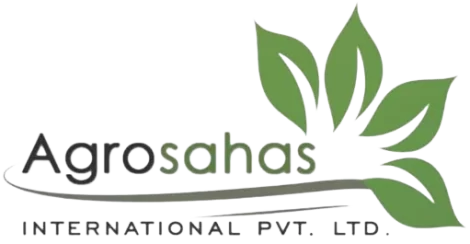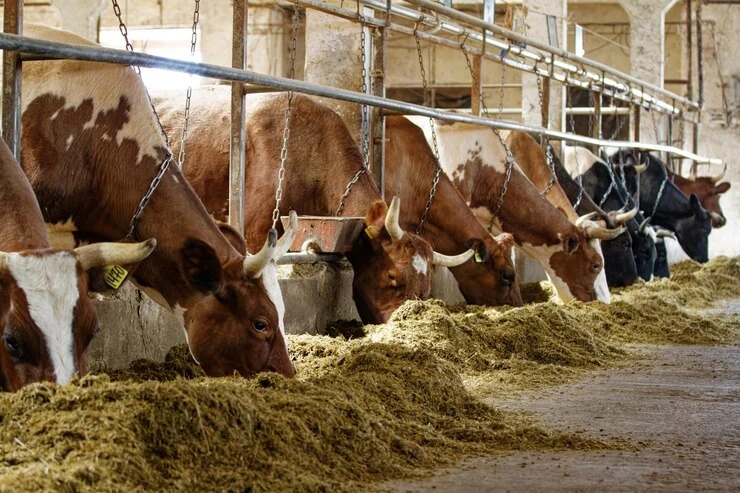In today’s rapidly evolving agricultural industry, the importance of adhering to global standards in animal nutrition cannot be overstated. Farmers, veterinarians, and animal nutritionists all play vital roles in ensuring that livestock receive the best care possible. Kukuchku Animal Feeds and Concentrates are not only locally developed for the needs of Ugandan farmers but also align with internationally recognized standards to ensure livestock health, productivity, and overall well-being.
This blog delves into how Kukuchku’s products meet global animal nutrition standards while exploring key aspects such as Uganda’s national animal feed policy, feeding standards, critical elements of animal nutrition, and the role of Total Digestible Nutrients (TDN) in optimizing animal diets.
What is the National Animal Feeds Policy in Uganda?
Uganda has made significant strides in regulating its livestock sector to ensure the quality and safety of animal feeds. The National Animal Feeds Policy, established by the Ugandan government, aims to promote sustainable animal feed production, ensuring that livestock farmers have access to high-quality, safe, and nutritious feed.
The policy addresses key issues such as:
- Quality control: Ensuring that animal feeds meet safety and nutritional standards through regulation and inspection.
- Sustainability: Encouraging the production of feed ingredients that are environmentally friendly and economically viable.
- Innovation: Promoting research and development to enhance the quality and efficiency of feed formulations.
At Kukuchku, we are aligned with Uganda’s national policy by ensuring our products undergo rigorous quality control measures. Our commitment to sustainability and innovation means that we continually refine our formulations, providing Ugandan farmers with feeds that not only meet local regulations but also align with global animal nutrition practices.
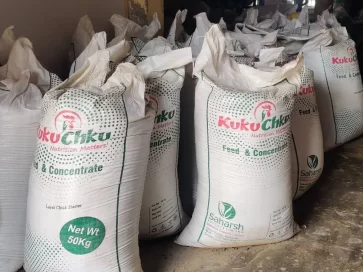
What Are Feeding Standards in Animal Nutrition?
Feeding standards in animal nutrition refer to the guidelines and regulations that determine the optimal nutrient content required for different types of livestock at various stages of growth and production. These standards ensure that animals receive balanced diets that promote health, reproduction, and productivity. Feeding standards are crucial in preventing malnutrition or overfeeding, both of which can lead to health issues and economic losses for farmers.
Kukuchku aligns with global feeding standards by ensuring that our feeds provide the right balance of macronutrients (proteins, carbohydrates, and fats) and micronutrients (vitamins and minerals). For example, our poultry feeds are formulated to meet the energy and protein needs of both broiler and layer chickens, ensuring faster growth rates and higher egg production without compromising the health of the birds. Similarly, our dairy concentrates are tailored to provide the necessary nutrients that support increased milk production and cow health.
These standards are influenced by factors such as:
- The animal’s life stage (growth, lactation, reproduction)
- The type of livestock (poultry, swine, ruminants)
- Environmental factors (such as climate or weather conditions)
What Are the Three Main Aspects of Animal Nutrition?
When it comes to animal nutrition, three main aspects form the foundation for creating an effective feeding regime. These include:
- Energy: Animals require energy to perform daily activities such as movement, growth, and production of meat, milk, or eggs. Feeds high in carbohydrates and fats, such as grains, provide animals with the necessary energy to sustain life and maximize productivity. Kukuchku Feeds are energy-dense, ensuring that livestock receives the calories they need for optimum performance.
- Protein: Protein is crucial for muscle development, tissue repair, and reproductive health in livestock. Feeds with high protein content, such as our broiler and pig concentrates, ensure that animals grow faster and produce more lean muscle mass. Kukuchku sources high-quality protein ingredients like soybean meal and fishmeal to meet livestock protein requirements efficiently.
- Vitamins and Minerals: These micronutrients play a key role in maintaining immune function, bone health, and overall vitality. Livestock, like humans, need vitamins (such as A, D, and E) and minerals (such as calcium and phosphorus) for proper bodily functions. Kukuchku ensures that all our feeds are fortified with essential vitamins and minerals, contributing to better health outcomes for animals.
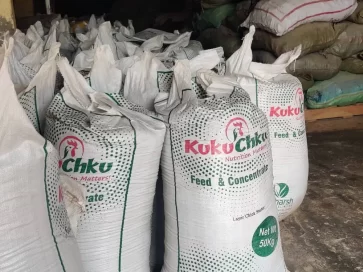
What is TDN and Why is It Important in Animal Nutrition?
Total Digestible Nutrients (TDN) is a measure used in animal nutrition to quantify the amount of energy available to livestock from a given feed. TDN is essential because it gives farmers and nutritionists an idea of how efficiently animals can convert feed into energy for growth, production, and maintenance.
The TDN value of a feed represents the total amount of digestible protein, fat, and carbohydrates available to the animal. Knowing the TDN of different feed ingredients allows farmers to formulate diets that meet the specific energy needs of their livestock. For instance, high-producing dairy cows require diets with high TDN values to support milk production, while growing pigs need a moderate level of TDN for muscle development.
At Kukuchku, we use precise formulations to maximize the TDN value of our feeds. Whether you’re raising broilers for meat or dairy cows for milk, our feeds are designed to provide the right amount of digestible nutrients, optimizing growth and productivity while reducing feed waste.
How Kukuchku Aligns with Global Standards for Animal Nutrition
As the demand for animal products like meat, milk, and eggs continues to grow, livestock farmers must adopt feeding strategies that meet both local regulations and global standards. Kukuchku stands out in the Ugandan market because of our commitment to producing high-quality animal feeds that align with internationally recognized nutritional standards.
Here’s how we ensure our feeds meet global expectations:
- Nutrient-Dense Formulations: All Kukuchku feeds are formulated with nutrient-dense ingredients to maximize growth and productivity. We source high-quality grains, proteins, and mineral supplements to ensure livestock get the optimal balance of nutrients.
- Precision in Nutrition: Our feeds are scientifically developed to match the specific dietary requirements of different livestock species. This precision ensures that animals get exactly what they need at each life stage, whether it’s for growth, reproduction, or lactation.
- Safety and Quality Control: We adhere to strict quality control measures to ensure that our feeds are free from contaminants, such as aflatoxins, that can negatively affect livestock health. Our commitment to safety extends beyond Uganda’s national regulations, aligning with the best practices followed by global animal feed manufacturers.
- Sustainability and Innovation: At Kukuchku, we understand the importance of sustainability in agriculture. Our research and development team constantly looks for ways to reduce environmental impact while improving feed efficiency. By promoting the use of locally sourced ingredients and minimizing waste, we contribute to a more sustainable livestock sector.
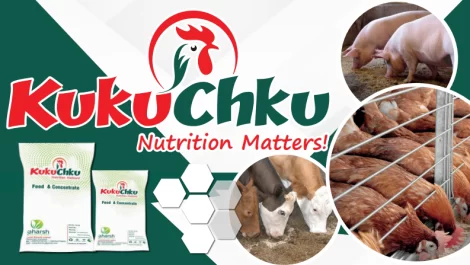
Conclusion
Kukuchku Animal Feeds and Concentrates stand at the intersection of local expertise and global standards. Our commitment to high-quality, nutrient-dense feeds ensures that Ugandan farmers can optimize livestock productivity while adhering to internationally recognized nutritional guidelines. By aligning with Uganda’s National Animal Feeds Policy and applying scientific principles such as TDN and feeding standards, Kukuchku remains a trusted partner for farmers who aim to raise healthy, productive animals.
